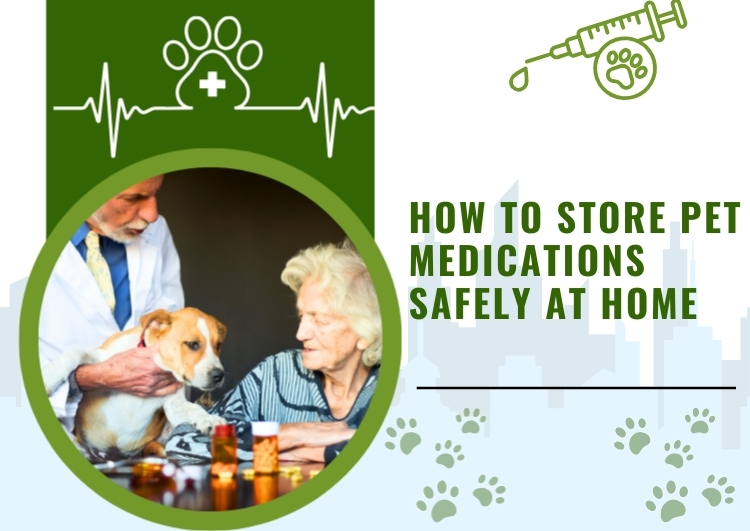When it comes to caring for our pets, giving them the right medication at the right time is only half the battle. The way we store pet medications at home plays a crucial role in maintaining their effectiveness and safety. Many pet owners don’t realize that improper storage can make medicines less effective, even harmful, for pets.
As the demand for reliable veterinary care grows, both veterinarians and owners are increasingly looking for trusted sources to purchase quality medicines. Choosing the right Pet Medicine Supplier in India ensures that you’re starting with safe, authentic products—but how you store them at home is equally important.
In this blog, we’ll walk through the best practices for storing pet medications safely, common mistakes to avoid, and why partnering with a reliable supplier matters.
Why Safe Storage of Pet Medicines is Important
Unlike human medicines, pet medications may come in various forms—chewable tablets, flavored liquids, topical solutions, or injectables. Each type has its own storage needs.
Storing medicines correctly helps:
- Maintain Effectiveness: Heat, light, or moisture can damage active ingredients.
- Prevent Accidents: Pets (and even children) may accidentally consume medicines if left in easy-to-reach places.
- Avoid Contamination: Exposure to bacteria or cross-contact with food can spoil medicines.
- Ensure Safety: Expired or improperly stored medicines can cause adverse reactions in pets.
Best Practices for Storing Pet Medications
- Follow the Storage Instructions on the Label
Every medicine comes with clear storage guidelines. Some need refrigeration, while others should be kept at room temperature. Always read the label and follow the manufacturer’s recommendations.
- Keep Medicines in Original Packaging
Pet owners sometimes transfer pills or liquids into other containers for convenience. However, the original packaging provides protection from light, air, and moisture—and also contains vital information such as dosage, expiry, and instructions.
- Store at the Right Temperature
- Room Temperature (20–25°C): Most tablets, capsules, and liquids.
- Refrigerated (2–8°C): Vaccines, insulin, and certain antibiotics.
- Avoid Freezing: Unless specifically instructed, never freeze pet medicines.
- Protect from Moisture and Sunlight
Bathrooms and kitchens are the worst places to store medicines due to humidity. Instead, choose a cool, dry place like a cabinet or drawer, away from direct sunlight.
- Keep Out of Reach of Pets and Children
Many pet medicines are flavored to make them easier for animals to consume. While this is helpful during dosing, it makes them tempting if left within reach. Always store medicines in closed cabinets or high shelves.
- Separate Pet and Human Medicines
It’s easy to confuse similar-looking tablets or bottles. Always keep pet medicines separate from human ones to avoid dangerous mix-ups.
- Monitor Expiry Dates
Expired medicines lose their effectiveness and may harm your pet. Create a simple calendar reminder to check medicine expiry dates monthly.
Common Mistakes Pet Owners Make
Even the most loving pet parents can make storage mistakes, such as:
- Leaving liquid medications on countertops.
- Storing medicines in hot cars or near windows.
- Mixing old and new medicines in the same container.
- Ignoring refrigeration requirements.
- Using expired products just to “finish the bottle.”
Avoiding these mistakes ensures your pet’s safety and the effectiveness of treatment.
Handling Special Types of Pet Medicines
- Refrigerated Medicines: Keep in the refrigerator’s middle shelf, away from the freezer section.
- Liquid Suspensions: Shake well before use but never dilute unless prescribed.
- Topical Treatments: Store in tightly closed containers to prevent leakage and contamination.
- Injectables: Handle with extra care and keep syringes stored safely, out of children’s reach.
Safe Disposal of Pet Medications
Proper disposal is as important as proper storage. Never flush unused pet medicines into sinks or toilets, as they can harm the environment. Instead:
- Return unused medicines to your veterinarian or pharmacy.
- Use local medical waste disposal programs if available.
- Wrap expired medicines in a sealed bag before throwing them in the trash to prevent accidental consumption.
Why Choosing the Right Supplier Matters
Safe storage starts with safe medicines. Working with a trusted Pet Medicine Supplier in India ensures that you’re buying genuine, properly packaged, and quality-tested products. Fake or poorly handled medicines may not work effectively—even if stored correctly at home.
Reliable suppliers also provide guidance on handling, storage, and expiry tracking, making life easier for both veterinarians and pet parents.
Final Tips for Pet Owners
- Always wash your hands before and after handling pet medicines.
- Never give human medicines to pets unless prescribed by a vet.
- Use labeled measuring devices for liquid medicines—avoid kitchen spoons.
- Keep an emergency kit with basic pet medicines in case of sudden health issues.
Proper storage of pet medications is a simple yet vital step in ensuring your pet’s health and safety. From keeping medicines in their original packaging to storing them at the right temperature and away from curious pets, these small practices can make a big difference.
At the same time, choosing a reliable Pet Medicine Supplier in India ensures you begin with authentic, safe, and effective products.
At Amino Pharma, we are committed to providing high-quality veterinary medicines and guidance to pet owners and clinics. Together, let’s ensure that every pet gets the safe, effective healthcare they deserve.

